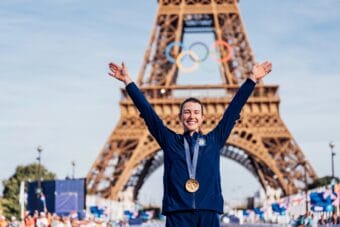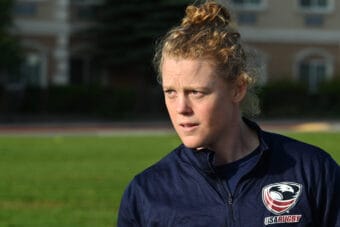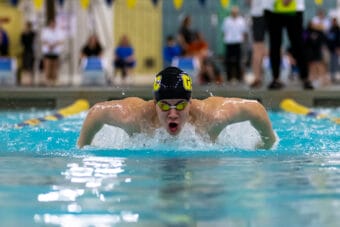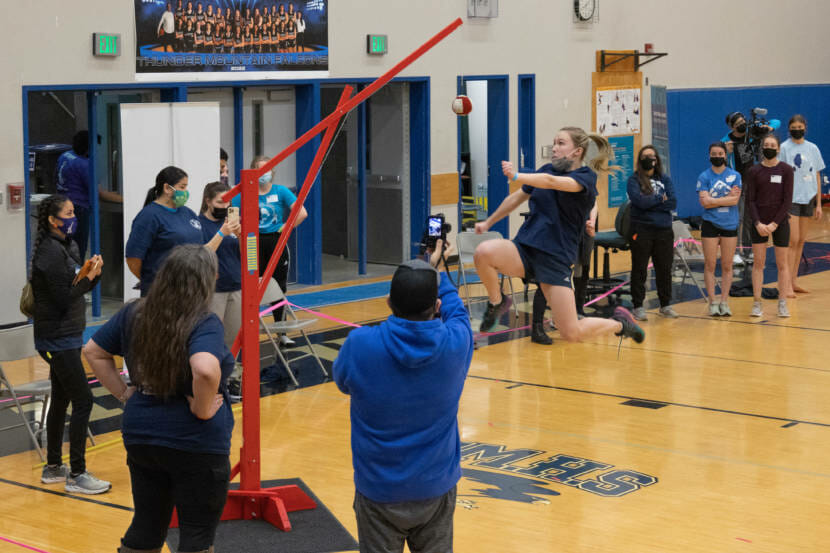
This past weekend Juneau had its first Native Youth Olympics competition open to the public since the pandemic.
This was the fifth year of the Traditional Games, and for many people who went, it felt a lot like the games before COVID-19. The dance group Woosh.ji.een was back for their usual opening performance, there was an audience again and more people came to compete.
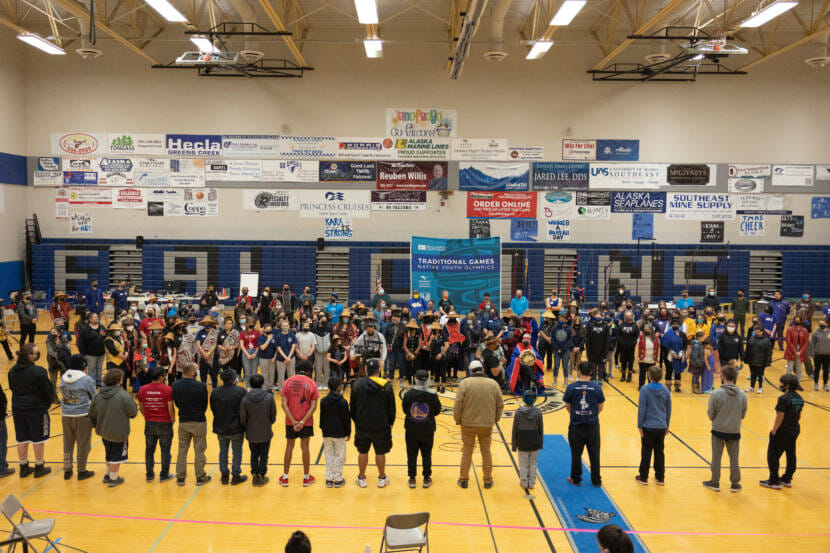
Alexandria Toloff coaches a team representing the Qutekcak Native Tribe from Seward.
The team isn’t new, but it hadn’t competed in an event for a few years before COVID. The team struggled to find coaches. But then during the pandemic, Toloff’s cousin got a job as a head coach for the team and Toloff offered to help and got involved in NYO again.
“I think we were all just tired of COVID,” Toloff said. “And we wanted to get together and start doing stuff again.”
When they got the opportunity to compete at the Traditional Games in Juneau, they jumped on it. Toloff had never been to Juneau and some of her athletes had never been on a plane before.
She said Juneau felt a lot like Seward with the mountains, glacier and the water.
As for the games, Toloff competed in most of the events. Her favorite event is the scissor broad jump because it’s less stressful, but she also likes the kicking events too.
“They really push you. Like you really have to tone in, and it really just takes like a lot of energy and force,” Toloff said. “And it is really really stressful but it takes a lot of passion and everyone gets into it.”
A lot of athletes look forward to training for NYO and going to competitions. The events are more than just the games, Toloff said. They are also about the culture, the dancing, the food and seeing your community come together.
“Like food for the soul, I would say,” Toloff said. “Sounds a little corny, but I mean it’s like, it, like, makes my heart happy to come here.”
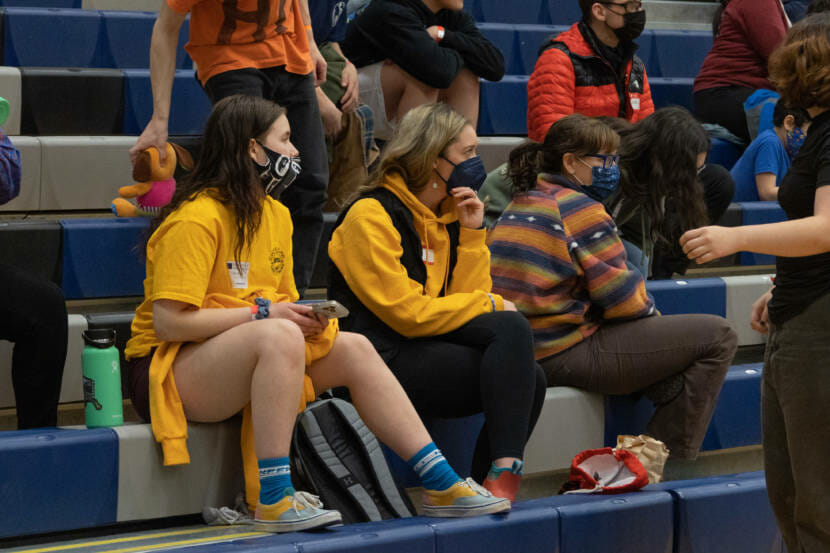
When the pandemic came to Alaska and NYO events were being canceled, it was hard on the NYO community.
It was during the 2020 Traditional Games that everyone found out that the Arctic Winter Games were canceled. And it was an emotional day for the people who were supposed to go to the competition.
“These are things we look forward to all year, and never thought that it would just be canceled,” said Kyle Worl, a wellness coordinator at Central Council of the Tlingit and Haida Indian Tribes of Alaska.
Worl is also an NYO coach for athletes in Juneau and played a big role in revitalizing the sport in Southeast Alaska. He did a lot of work to keep NYO going during the pandemic. He did some practices on Zoom, and they made an NYO version of the brush challenge on TikTok.
The virtual events were needed and it helped people get through the pandemic, but it really doesn’t compare to in-person events, Worl said.
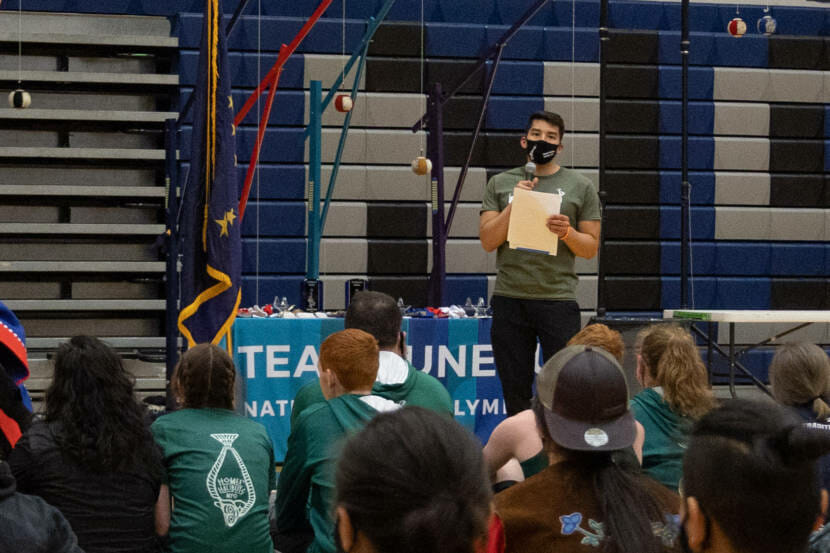
And a lot of people were excited to be back. Worl said this year he had the most teams ever attending the Traditional Games, and about the same amount of athletes as the event before the pandemic.
Eventually, Worl wants to have an NYO team in every Southeast community. He said he wants to give kids here the same opportunities he had with NYO in high school and share his love of the games.
It’s rubbed off on a lot of Worl’s athletes, including Ezra Elisoff.
“I think he is executing his goal very well because I share the same love and passion for the sport now,” Elisoff said.
Elisoff first started NYO at Thunder Mountain High School as a way to stay in shape, but he stayed because the community was so supportive of him.
A lot of the games are based on hunting and survival techniques Indigenous people in northern Alaska had. And Elisoff learned from Worl that the spirit of the games — that support you give the other athletes — is like hunting with fellow hunters in another community. People wouldn’t want other hunters to not bring home food for their families and elders.
“That spirit is still with us, even though times aren’t that extreme,” Elisoff said. “We still like to see each other succeed and we still like to support one another because that’s what our ancestors did so long ago.”
That’s why athletes give each other advice and share techniques instead of hiding them.
That spirit is what keeps Elisoff doing NYO.
“I actually plan on doing it until I’m like an old man and complaining about my eight keys,” Elisoff said.
There is no age limit for the World Eskimo Indian Olympics, though Elisoff said he probably doesn’t want to be doing it when he’s 90.

